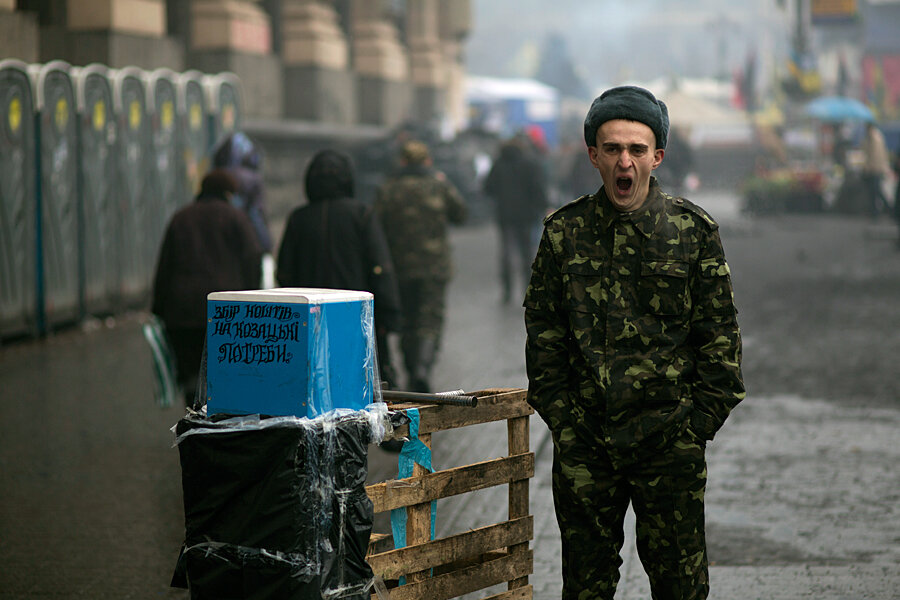Ukraine's other crisis: an economy in freefall
Loading...
| Paris
As the threat of a Russian military intervention looms over the future of Ukraine, its economic solvency is posing just as big a test to the country's integrity.
Ukraine's needs are so dire that its transitional authorities, who are seeking billions in aid, have vowed to meet any demands that lenders place on it, even as previous attempts to do just that have failed. And that may result in significant short-term pain to Ukrainians, via unpopular measures like cuts in subsidies for utilities.
"The biggest problem at the moment is the threat of war,” says Joerg Forbrig, an Eastern Europe expert at the German Marshall Fund of the US in Berlin. But "the second most pressing problem is how this country is equipped financially, and the financial equipment is way below what you would consider sufficient. They are within months of default.”
Ukraine's hard currency reserves have fallen to less than $18 billion, and it owes some $8 billion, including a gas bill to Russia and payments to the International Monetary Fund. This January's industrial production was down 5 percent from January 2013.
"There has long been a need for an immediate cash injection, which is what the EU did not offer, and where Russia stepped in with $15 billion,” says Mr. Forbrig, of the EU’s trade and association agreement that Ukraine rejected in November, leading to three months of protest.
Now countries are scrambling to offer money to the cash-strapped nation, in an effort to move it away from dependency on Russia, which has only disbursed $3 billion of the $15 billion it promised in aid after Ukraine rejected the EU offer.
A team from the International Monetary Fund (IMF) arrived in Kiev Monday and were scheduled to begin consultations today to put together a package that might prove unpopular with Ukrainians.
The US and the European Union are working on funding programs that could provide immediate stabilization funds to Ukraine, but have suggested that they will do so alongside the IMF. "No member state will move without the IMF evaluating Ukraine's financial needs," a European source told Agence France-Presse Monday.
An IMF loan would obligate Ukraine to make unpopular reforms, including cutting energy subsidies. But deep structural change – such as reforming the court system and ending various monopolies in the economy – is needed to root out corruption and return the country to growth, says Adrian Karatnycky, an expert on Ukraine with the Atlantic Council of the United States. “Otherwise you’ll stabilize and then bad habits will [emerge] again in six months.”
The White House did announce today that it is providing Ukraine with a $1 billion loan package to help soften the pain of ending energy subsidies, reports the Associated Press. And the US said it plans further aid to Kiev to reduce Ukrainian dependence on Russian energy imports.
This will not be the first time the IMF has worked with Ukraine. It has provided several loans to Kiev since the 1990s, after Ukraine won independence. And the IMF agreed to loan $15 billion in 2010, but the deal ended after Ukraine failed to implement reforms.
This time, however, authorities have said they are willing to make unpopular decisions because, quite simply, they have no choice. “[We] will meet all IMF conditions,” said acting Prime Minister Arseniy Yatsenyuk to the Financial Times Monday, “for a simple reason ... we don’t have any other options.”








